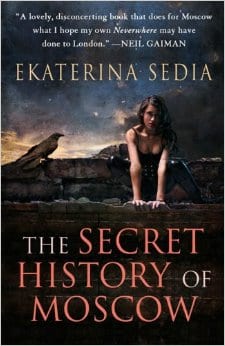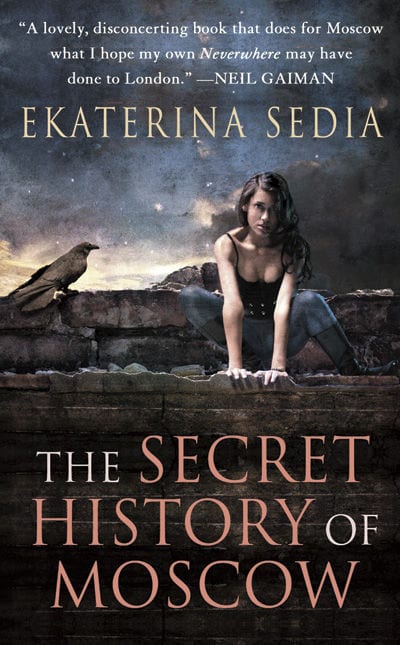Book Review: ‘The Secret History of Moscow’ by Ekaternia Sedia mixes fantasy and fact
 Written by Rich Rogers
Written by Rich Rogers
“The Secret History of Moscow” by Ekaternia Sedia
2007, Prime Books, Paperback and Kindle
304 pages paperback, 311 pages Kindle
It’s the early 1990s, and things are changing in Moscow. Communism is out, capitalism is in, gangs are out in the open under the new regime, and people are disappearing. Galina’s sister was pregnant, gave birth to a baby in the bathroom, turns into a jackdaw and then disappears. Yakov is a policeman who is assigned to look into the disappearances. To make things more interesting, he saw a man change into a bird and is trying to convince himself he didn’t see it. Fyodor is a street artist who simultaneously fears and loves gypsies and see things others don’t.
Galina and Yakov meet up with Fyodor one night so he can show them something new. It’s stranger than they think: shadow doors opening in reflections, spilling very real birds out into Moscow. Then he leads them to another door in the subway that takes them to underground Moscow where the past still lives. The find ancient gods from Russia’s past. Buildings thought burned and destroyed are still smoldering, guarded by members of Napoleon’s army, people who sought escape, Jews who sought escape from the pogroms. The world they discover is stranger than the strangest fairy tale.
And more dangerous as well.
But Galina just wants to find out what happened to her sister.
As the three begin their search–Yakov because he’s doing his duty as a police officer, and Fyodor because he really doesn’t have anything else to do–they discover more and more about the world they thought they knew.
Set against the changes of 1990s in Russia, “The Secret History of Moscow” by Ekaternia Sedia creates an interesting paradoxical view of the world. You think history is set, and then you discover the history you know may not be the real deal.
As the world the main characters discover changes around them, our searchers find themselves also changing. Myths are real, not just stories. Histories aren’t real. The secret history of Moscow.
Sedia’s language is an interesting mix of lyricism and street language, and often the paradox is a little too jarring, especially when it is coming from characters who in their original lives wouldn’t have used it.
As a side note, it’s a sad statement on the state of writing these days that authors think they have to put street language in everyone’s mouths. I’m fully aware of how much it is used, but not everyone does, and too often writers do it to show their hipness, their connection to the real world, or their so-called maturity. But it’s lazy writing.
Anyway, back to “The Secret History of Moscow.” While you don’t have to be familiar with Russian mythology to follow the story, it helps. Often I found myself wondering about the stories behind many of the deities presented in the story. In addition, some of the adventures in the underworld leave something to be desired, again, leaving me wanting to know more about the various characters and deities presented. However, that doesn’t take away from a believable and moving climax to the story.
“The Secret History of Moscow” is definitely worth hunting down in your favorite bookstore.
Rich welcomes questions and comments from readers. You may reach him at [email protected].




